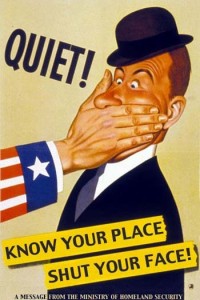I read with interest yesterday a post on a “wide-ranging” Senate investigation into the federal government’s use of public relations services. From the Institute for Public Relations website:
“Twice in the past year there have been investigations into public relations spending by the federal government. The most recent was launched in late February by Senator Claire McCaskill (D–Mo.) and Senator Rob Portman (R–Ohio), who have triggered a wide-ranging investigation of the federal government’s use of public relations and advertising services. At the initial stages of this inquiry the Subcommittee is seeking data for the past five years pertaining to “contracts for the acquisition of public relations, publicity, advertising, communications, or similar services” at 11 separate Federal agencies. We have our concerns, which we expressed directly with the Senators and through an op-ed published in Roll Call.”
 It will be interesting to see where the investigation leads. Similiar controversies have frequently arisen over the years when some members of Congress perceive a federal agency’s public relations activities are overly promotional of a policy or program, particularly in an election year. The Department of Defense, Department of Education, Department of Health and Human Services, Federal Communications Commission, Internal Revenue Service, and and other federal agencies have drawn congressional scrutiny during the past decade for potential violations of:
It will be interesting to see where the investigation leads. Similiar controversies have frequently arisen over the years when some members of Congress perceive a federal agency’s public relations activities are overly promotional of a policy or program, particularly in an election year. The Department of Defense, Department of Education, Department of Health and Human Services, Federal Communications Commission, Internal Revenue Service, and and other federal agencies have drawn congressional scrutiny during the past decade for potential violations of:
- 5 U.S.C. 3107 prohibiting the use of appropriated funds to hire “publicity experts”
- Annual appropriations law prohibiting funds being used “for publicity or propaganda purposes within the United States not heretofor authorized by Congress”
- 5 C.F.R. § 1320.3(c), as detailed in U.S. Office of Management and Budget Guidance on Agency Survey and Statistical Information Collections, regulating audience research (including surveys and focus groups)
- The Smith-Mundt Act requiring the U.S. public be insulated from government-sponsored information and broadcasting directed at audiences beyond America’s borders (kind of hard in a Web 2.0 world)
According to the Congressional Research Service, however, the laws prohibiting the hiring of publicity experts and the expenditure of appropriated funds on publicity and propaganda in actuality place very few limits on agency public relations activities:
“(1) No federal entity is required to monitor agency compliance with the publicity and propaganda statutes. At present, the federal government has what has been termed ‘fire alarm oversight’ of agency expenditures on communications. Scrutiny typically occurs when a Member of Congress is alerted by the media or some other source that an agency’s spending on communications may be cause for concern. A Member then sends a written request to the Government Accountability Office asking for a legal opinion on the activities in question.
(2) The terms ‘publicity,’ ‘propaganda,’ and ‘publicity expert’ have been interpreted to forbid a very limited number of activities. Congress has not defined the terms ‘publicity,’ ‘propaganda,’ and ‘publicity expert.’ Thus, to GAO has gone the task of delineating what these terms encompass. GAO has done this on a case-by-case basis over the past half-century. Generally speaking, GAO has narrowly defined these terms. It has held that the ‘publicity or propaganda’ prohibition in appropriations laws forbids any public relations activity that:
- involves ‘self-aggrandizement’ or ‘puffery’ of the agency, its personnel, or activities;
- is ‘purely partisan in nature’ (i.e., it is ‘designed to aid a political party or candidate’); or,
- is ‘covert propaganda’ (i.e., the communication does not reveal that government appropriations were expended to produce it).
GAO has interpreted ‘publicity expert’ to mean someone who ‘extols or advertises’ an agency, ‘an activity quite different from disseminating information to the citizenry about the agency, its policies, practices, and products.”
Social media has further complicated this interpretation and enforcement challenge.
I agree with the op-ed Gerard F. Corbett, chairman and CEO of the Public Relations Society of America, wrote for Roll Call:
“Any investigation into the government’s use of PR firms should not be undertaken unilaterally. It must be met by an equally robust examination of how the government communicates with the public and how it can better use innovative PR firms and professionals to best reach and inform citizens.”
Federal agencies deserve less ambiguity on where to draw the line between the appropriate use of funds for public education and general information and the inappropriate use of tax dollars to promote themselves, a political agenda, or U.S. foreign policy. Communications practitioners who serve federal government clients need to watch this investigation—and adhere to any resulting law changes—carefully.
Do you think this investigation will lead do anything?
Un vrai plaisir de voir ce papier, je vous remercie grandement !!!
De rien! J’espère que vous m’écrire à nouveau!
This web site certainly has all of the information I needed concerning this subject and didn’t know who to ask.
I am glad you found the post useful, Jerome! Thanks for your comment.
Just wanted to say I love reading through your blog and look forward to all your posts! Keep up the great work!
When some one searches for this essential information, it is hard to find something concise with enough relevant detail. So glad it is maintained over here.
I think there is some confusion in the federal contracting about what is a marketing “no no.”
Thanks for finally writing about “Limits on Federal Public Relations Activities? Sort of…” This is useful information.
Thanks Geoffrey, Anonymous, and Frank for your kind words. Glad you found this post useful! As an FYI, I have been looking for updates on this subject, but I have not found any. I presume that means the investigation is still ongoing?!?? Has anybody heard anything I missed?